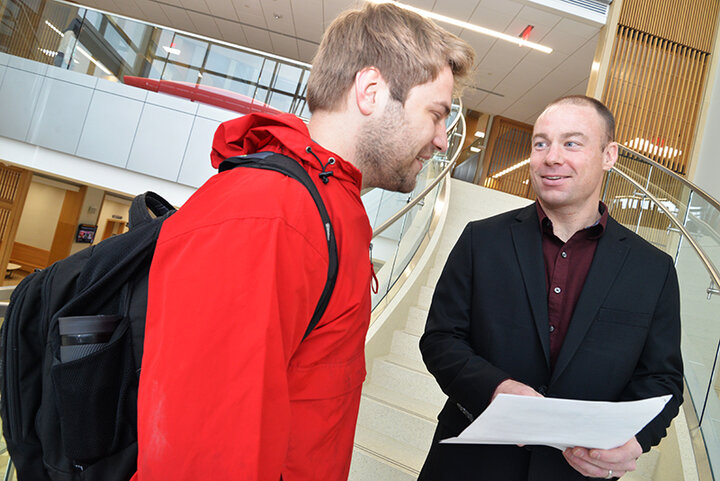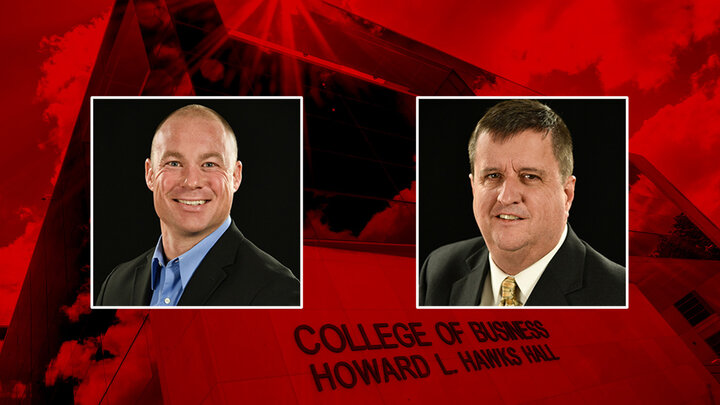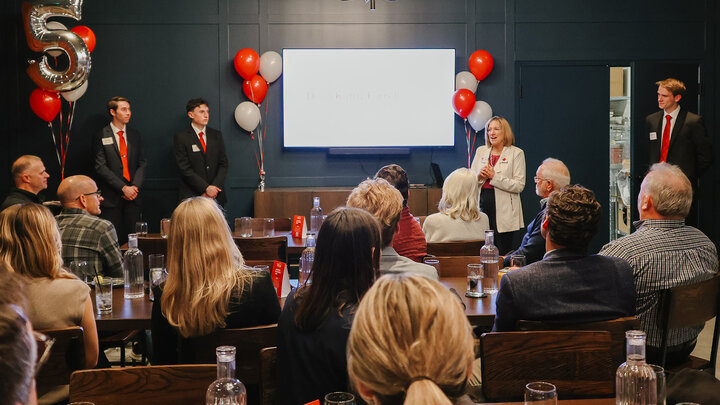Two tenured faculty, Jimmy Downes and Eric Thompson, joined the management team at the University of Nebraska–Lincoln College of Business as department chairs, August 1. Celebrating its fifth anniversary this year, Howard L. Hawks Hall houses six academic departments with Downes leading the School of Accountancy (SoA) and Thompson spearheading the Department of Economics.
“We are excited to have two highly qualified professors taking the helm of these departments. Both Eric and Jimmy have proven records of strong research, excellence in teaching and a willingness to serve," said Janet Near, associate dean of faculty and research, Howard L. Hawks Chair in Business Ethics and Leadership and professor of management.
Faculty in both departments shared their recommendations for chair earlier this year with Kathy Farrell, James Jr. and Susan Stuart Endowed Dean and professor of finance, who then appointed Downes and Thompson to their posts. As department chairs, they also serve on the dean’s management team along with four other department chairs at Nebraska Business — Richard DeFusco, department chair and professor of finance; Jonathan O'Brien; Jennifer Ryan, department chair and professor of supply chain management and analytics and Van Horne Family Endowed Chair; and Ravi Sohi, department chair and professor of marketing, Robert D. Hays Distinguished Chair of Sales Excellence and executive director of the Center for Sales Excellence.
Jimmy Downes, director of the School of Accountancy and associate professor of accountancy
Joining the College of Business in 2014, Jimmy Downes received his Ph.D. in accounting from the Spears School of Business at Oklahoma State University. He also worked in public accounting for a Big 4 firm for two years prior to earning his doctorate and currently holds an active CPA license.

“My top short-term goal as director is to shift younger students’ mindsets about accounting in order to grow undergraduate enrollment. Many freshmen and sophomores misunderstand what accounting is all about. Not only does accounting provide the foundation of a business, but it is also based on building personal relationships. This is important given the current evolution of the accounting profession,” said Downes, who wants to help with the hiring shortage by increasing the number of quality accounting graduates in the job market.
In addition, he plans to continue building on the foundation of the school's strong research productivity. He shared how this includes enabling faculty to spend quality time on research and discovery while increasing the global brand of the SoA’s research reputation.
"These goals align with the college's strategic plan. The faculty’s combined efforts toward teaching and research make the School of Accountancy a great place to be a director. There has been a collective effort to provide top-level education to accounting students at both the undergraduate and graduate levels. Students have multiple job opportunities, highlighted by the 98% career placement for our graduates, and many options for hands-on experience through internships," said Downes.
He also noted the strong research output within the school. Currently, the SoA ranks No. 3 in the world for tax archival research and No. 7 in the world for audit archival research in the BYU Accounting Research Productivity Rankings.
Downes' main research areas include the taxation of U.S. multinational companies and the accounting for cash flow derivatives. A recent article titled, "U.S. Multinational Companies’ Payout and Investment Decisions in Response to International Tax Provisions of the Tax Cuts and Jobs Act of 2017," was published in The Journal of the American Taxation Association and featured in The Los Angeles Times, The Washington Post, CFO Magazine, Politico, Law360, the American Accounting Association, Accounting Today and CPA Practice Advisor. Co-authored with professors Brooke Beyer from Kansas State University, Mollie Mathis at Auburn University and Eric Rapley at Colorado State University, they found that domestic capital expenditures and share repurchases increased for multinational companies with low domestic liquidity and high domestic investment opportunities after the Tax Cuts and Jobs Act of 2017.
"In contrast, multinational companies with low domestic liquidity and low domestic investment opportunities increased dividends. Additionally, companies with high foreign cash and most vulnerable to the global intangible low-taxed income regime increased their foreign but not domestic capital expenditures — a potential unintended consequence," Downes said.
The Financial Accounting Standards Board also utilized his research, published in the Review of Accounting Studies, while in the process of setting standards. In the article titled, "Do Sophisticated Investors Use the Information Provided by the Fair Value of Cash Flow Hedges?," Downes worked with John Campbell from the University of Georgia and William Schwartz Jr. from Oklahoma State University to find that analysts do not correctly incorporate unrealized cash flow hedging gains and losses into their two- and three-year-ahead earnings forecasts but correct their errors after the hedges have largely expired.
Downes and his wife, Jessica, have three children: Mason, age 4, and twins Brayden and Olivia, age 1.
Eric Thompson, department chair, K.H. Nelson College Professor of Economics and director of Bureau of Business Research
Originally from Buffalo, New York, Eric Thompson came to Nebraska in 2004. He earned his Ph.D. in agricultural economics at the University of Wisconsin-Madison and studied public policy at the University of Chicago.

"The Department of Economics has made great progress in recent years increasing its research output and offering new and innovative classes. As chair, I want to support faculty in our department as they continue to build on that momentum and will work with them to develop strategic goals for the next few years. I hope that my administrative experience as director of the Bureau of Business Research (BBR) will help me in my new role as chair," Thompson said.
Thompson leads a team of faculty, staff and students in the BBR, an applied economic and business research entity. The BBR provides relevant information and insightful data on economic conditions in Nebraska, the Great Plains and the nation as a service to individuals and businesses in the state. Business leaders, policymakers and communities utilize the research to make better decisions.
“We publish reports summarizing BBR-sponsored research studies, outlooks and analyses, including monthly Nebraska Leading Economic Indicator to measure and project the Nebraska economy,” said Thompson. "The Nebraska Leading Economic Indicator helps people better understand the factors that play a role in the growth and decline of economic conditions in our communities."
He and his team also tackle grant-funded projects to turn data into valuable economic insight for chambers of commerce, companies, and government entities including the U.S. Department of Commerce. This includes research on economic competitiveness, economic modeling and forecasting, labor market analysis, fiscal analysis, policy analysis and tourism impact.
Each year, 15 undergraduate students also participate in the research as BBR Scholars. They learn various advanced economic research methods and techniques, collaborate in writing research reports and help present their findings.
"I believe teachers and researchers have the greatest impact when they research topics that interest them and when they share what they have learned in the classroom. Working at a university provides me with the freedom to choose the topics I study and a chance to offer classes regularly in my area of expertise," said Thompson.
He shared the work he took the most pride in was published in the Journal of Regional Science about the relationship between entrepreneurship and employment growth in local economies. He and his co-authors Devin Michelle Bunten at the Massachusetts Institute of Technology, and Stephan Weiler and Sammy Zahran, both at Colorado State University, found that local information about entrepreneurial opportunities generated by both business births and deaths encouraged employment growth within metropolitan areas.
"Cities are a key engine of growth in our national economy. I enjoy examining how factors such as infrastructure, entrepreneurship, education and taxation influence the growth of metropolitan economies. I also enjoy offering courses on these same subjects as well as introductory courses in economic theory that prepare undergraduate students to study economic subjects which interest them. As chair, I will continue to teach undergraduate courses in regional development and microeconomics," he said.
He and his wife, Edit Kranner, who works as a consultant in the telecommunications industry, have three sons who attended Big Ten schools. Daniel, 24, graduated from the University of Michigan; Eric, 21, graduated from the University of Minnesota, and Andrash, 19, currently attends Nebraska Business.




